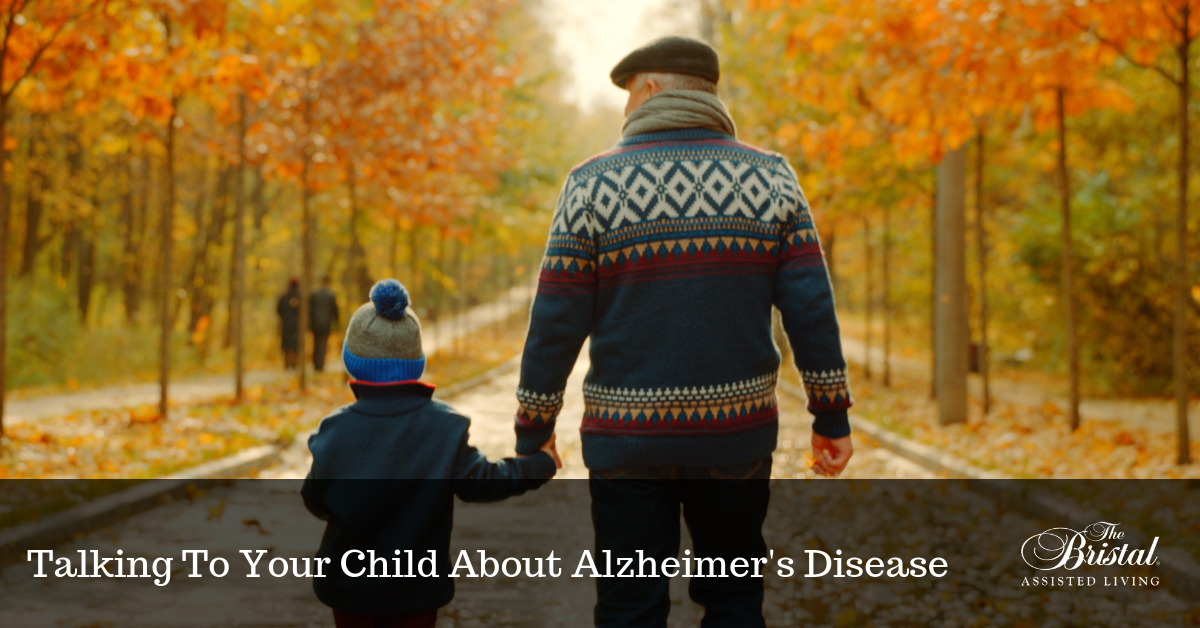When a much loved parent or aging family member has been diagnosed with Alzheimer’s disease, families often struggle to understand what that really means and how to cope. A common challenge is talking with their children about Alzheimer’s. Because the symptoms come and go in the early stages of the disease, kids frequently have difficulty understanding what is going on with a grandparent.
The Emotional Challenge of a Grandparent’s Alzheimer’s Diagnosis
Because a grandparent still looks the same, it can be tough for children to understand they are sick. Some of the time a grandparent may act like their old self. The grandparent and grandchild can engage in the same activities and conversations they always have. Other times they can’t even remember their grandchild’s name.
For children, the unpredictable course of Alzheimer’s can be confusing. They may feel as if their grandparent doesn’t love them any longer when they suddenly don’t remember their name or that they have done something to cause a difficult behavior such as agitation to flare. It can lead to anxiety and sadness on the part of the grandchild as they struggle to cope.
When your senior loved one reaches the point in the disease where these changes are hard to ignore, it is time to prepare to have a conversation about Alzheimer’s disease with your children.
Preparing to Talk with Kids about Alzheimer’s Disease
Beginning the conversation about Alzheimer’s with children can be difficult. Experts from the Mayo Clinic believe preparing ahead of time and anticipating children’s questions can make the conversation go more smoothly.
Some of the difficult questions and concerns that are likely to come up when talking with your children about Alzheimer’s include:
• Can you “catch” Alzheimer’s disease?
• Doesn’t grandpa love us anymore? He doesn’t remember our names.
• Did I do something to make Grandma mad? She was fine at first and now she’s really mad.
• Is it my fault she lost her glasses? She said it was.
• I’m embarrassed when grandpa acts so strange in public.
Starting the Conversation
One of the best ways to start the conversation is by asking the child if they’ve noticed any changes or anything different about their grandparent lately. It can give you a better understanding of how they might be feeling, especially if you’ve never discussed the disease before this conversation. Then move on to explain that Alzheimer’s is a disease and reassure the child that they can’t catch it.
The Alzheimer’s experts from the Fisher Center for Alzheimer’s Research also say a few things to keep in mind during the conversation are:
• Remember to stay age-appropriate. Providing too technical of an explanation for Alzheimer’s might be good for teens but too confusing for young children.
• Reassure kids that Alzheimer’s isn’t contagious. You or they can’t catch it like you do a cold.
• Ask them how they are feeling about all of this. Don’t assume you know what they understand and how they feel.
• Explain to the kids it is the disease that is making their grandparent act this way and they can’t help it. If they could change it, they would.
A few resources that can help you understand more about how to explain Alzheimer’s and how to answer the most common questions children have about it are:
• The Alzheimer’s Association has several video series including, Kids Look at Alzheimer’s that are designed to help families tackle this topic. Video topics range from Libby, a grandmother, explaining Alzheimer’s to her grandson to children sharing their stories to help other kids and teens cope.
• Another helpful resource to use when explaining to teens how Alzheimer’s affects the brain is an interactive tour, Inside the Brain. As teens work their way through the tour, sections in the brain that are responsible for different jobs and tasks change color and light up. The tour then goes on to show how Alzheimer’s causes damage to the brain.
• There are several books written for kids that can also help with this conversation. They include The Memory Box by Mary Bahr; Still My Grandma by Veronique Van Den Abeele; and What’s Happening to Grandpa by Maria Shriver.
Visiting a Grandparent Who has Alzheimer’s Disease
While the diagnosis of Alzheimer’s disease does change the relationship between a grandparent and grandchild, there are still many positive ways they can stay engaged with one another. Here are a few suggestions:
• Easy arts and crafts projects are a great way for grandchildren to spend time with a grandparent living with Alzheimer’s disease. If you aren’t the creative type, your local craft store will have boxed craft sets with ability levels marked on the package. Most can be purchased fairly inexpensively.
• Music is one of the best types of therapy for those with Alzheimer’s. Your child and their grandparent can listen to old songs from “back in the day” and dance along to the beat.
• Gardening is another activity with therapeutic value for seniors living with Alzheimer’s disease. Let your loved ones create a container garden together or help you take care of an existing garden.
• Looking through family scrapbooks and old photos is another way to keep both generations engaged. Your kids will enjoy seeing photos of you and your parent from younger days!
• Simple counting and sorting games can help soothe agitation and provide an activity for your family members to enjoy. It might be sorting poker chips and cards or separating and counting coins in a jar.
Dementia can create challenging situations for families. We hope this information helps you talk with your children and teenagers about what is happening to a loved one who has Alzheimer’s.




